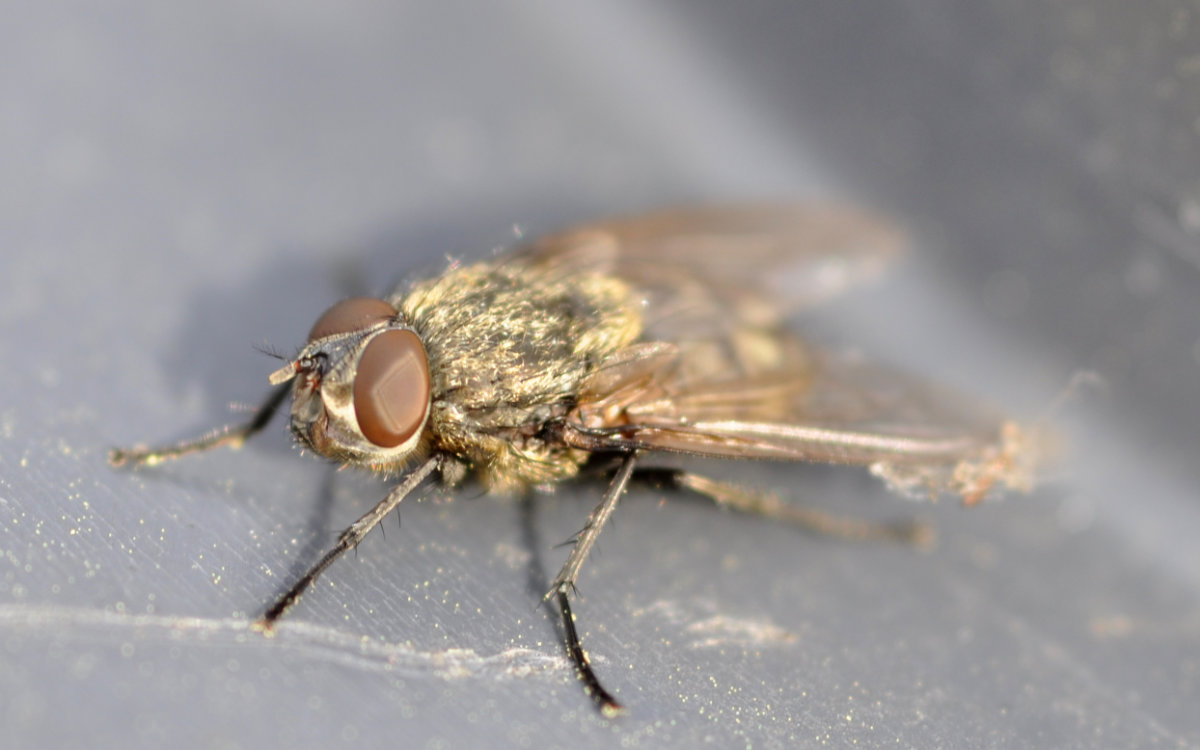What are cluster flies and how do you get rid of a cluster fly infestation?

Aiwok [CC BY-SA 3.0], via Wikimedia Commons
Pests are irritating, unsightly and insanitary – which is why finding an infestation is worrying – and finding cluster flies is no exception. Cluster flies are 8mm long and are a dark grey colour, with small patches of gold hair on their back and long wings. Appearing in spring, cluster flies will begin to lay eggs outside and will hibernate in your home around nearing winter, around August time. To get rid of cluster flies you can use your vacuum cleaner, aerosol fly killer or call your local professionals who will be able to use smoke bombs or foggers for more effective results.
Have You Found Cluster Flies In Your Home?
Unless dealt with properly, cluster flies will likely remain a nuisance.
How did cluster flies get into my home?
Cluster flies make their way into the home through doors and windows, around loose electrical outlets, under roof eaves, openings around cables, pipes and through vents.
How to identify cluster flies
The obvious sign of a cluster fly infestation is to see a large quantity of lame or dead flies. It’s also very common to find them in your loft, in sunken spot lighting or under insulating felt layers. Cluster flies typically return year after year, unless eaves and other entry ways are adequately sealed.
I’ve found attic/loft flies – what do I do?
If you find cluster flies in your attic, try to prevent these pests by using a ‘Citronella’ fragrance wick that emits a smell into this area, which can work to deter these flies from returning. Alternatively, you can spray these insects with fly killer and vacuum the area afterwards. If your problem still returns in August/September time, call your local pest controllers who will be able to utilise more effective methods, that’ll eliminate your pest problem.
What’s the most effective cluster fly treatment?
The most effective cluster fly treatment are smoke bombs and foggers but it’s recommended to have a professional do this because the fumes can also be harmful to human respiratory systems. Expert pest controllers will have all the equipment to ensure safe and effective cluster fly treatment, so you needn’t risk your health and you’ll be able to enjoy a fly-free home.
How long do cluster flies stay?
Throughout Autumn, you will find these in large congregations hibernating in attics, sheds and garages but as soon as spring comes around, they will make their way back outside.
Methods for getting rid of cluster flies
There are many things you can do to remove cluster flies in a property, some are more effective than others but we have made a list of things you can do to remove your cluster fly infestation.
- Insect spray
- ‘Citronella’ fragrance wick
- Vacuum cleaner
- Sealing all openings around doors, windows, eaves, pipes, electrical sockets…
- Foggers (performed by a trained professional)
- Smoke bombs (performed by a trained professional)
- Electric fly killers
- Fly boxes
Make sure your home is tidy and clean, cluster flies love food and drink spills, stagnant water, open rubbish bins and pet excrement. If you’re aware of having a cluster fly issue, install fly screens over your windows, to prevent them from making their way inside.
What are the risks/diseases of cluster flies?
Cluster flies have no direct health effects on humans but the sheer amount of flies produce a noticeable amount of excrement, that’ll stain walls, floors and belongings, and produce a strong and unpleasant odour.
Cluster flies are an annoyance in domestic settings but pose a big threat to commercial settings, such as restaurants. Cluster flies can contaminate food preparation areas and even food, so it’s important to stop preparing food until the pest problem is completely eliminated. Otherwise, it’s likely they will face fines, a bad reputation or worse, shut down by health and safety officers.
What’s the difference between cluster flies and houseflies and bluebottles?
It’s very hard to distinguish between which fly is which, other than the size of the fly, but we’re here to help you identify the most common flies.
- Cluster flies – typically 8mm long, which is slightly larger than the usual housefly. Cluster flies dark patches are darker in colour than that of a housefly but cluster flies have patches of short gold hair on their thorax. Cluster flies are mainly recognisable by their laboured movement.
- Houseflies – these flies have light grey bodies and clear black, vertical lines on top. Houseflies are constantly in search for available food and water sources and are more threatening to our health because they regularly rummage through bins and land on any excrement they can find.
- Bluebottles – these are the same size as houseflies, their bodies are a petrol colour, often blue/purple when they catch the light. Adult bluebottles have big red eyes and long, transparent wings. Bluebottles are also a health concern because they land on excrement and rotting flesh, so it’s important to remove them as soon as you can and to keep all food covered to prevent contamination.
For help and assistance with pest control, call Pest Defence today for quick and reliable services. With a wealth of experience within the industry and experts ready to provide fast responses and effective control for any emergency issues – you know that you can trust us to get the job done. We operate throughout a number of locations including: Colchester, Chelmsford, Brentwood and the surrounding areas.
